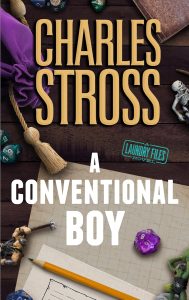A Conventional Boy by Charles Stross: Review by Russell Letson
 A Conventional Boy, Charles Stross (Tordotcom 978-1-250357-847, $28.99, 224 pp, hc) January 2025.
A Conventional Boy, Charles Stross (Tordotcom 978-1-250357-847, $28.99, 224 pp, hc) January 2025.
Charles Stross expands his series about the highly secret and secretive counteroccult-threat agency nicknamed the Laundry with a volume made up of a new short novel, accompanied by a pair of previously published pieces. The novel, A Conventional Boy, is the origin story of a particular Laundry employee, as well as an homage to tabletop fantasy gaming and nerdery in general. In the Laundry Files universe, the imaginary garden of a Dungeons & Dragons game can wind up having real demonic toads in it, or worse. So when Derek Reilly was a teenager in 1984, the D&D games that he and some friends played were mistaken by moral-panicky Laundry operatives as actual eldritch summonings, and the kids were snatched up, and interrogated and investigated to a fare-thee-well. The friends were eventually let go, but Derek somehow wound up in a disused holiday camp repurposed as an internment facility for those the Laundry deemed to be demented or dangerously gifted. And while they’re generally right about such threats, the Laundry officials were wrong about Derek, who had ‘‘never actually done anything to deserve incarceration…. He was… an embarrassment to the Laundry, like the random goatherds who ended up in Guantanamo Bay because someone had sold them to a credulous CIA agent in return for the bounty on Al Qaida members.’’
More than 25 years later, Derek is a model detainee, a middle-aged trusty with mail privileges that he uses to conduct slow-motion, paper-based role-playing games, a man-child with no practical knowledge of or experience with the post-1980s world. Nevertheless, lured by a newspaper notice about the DiceCon 16 gaming convention, he manages to escape the camp’s elaborate and often dire security measures and find his way to the con, which turns out to harbor just the kind of threat that Derek was once thought to pose: the Omphalos Corporation’s marketing team, who are recruiting players for a sample session of their new release, Bones and Nightmares. The game’s eldritch horrors and sanguinary dangers are, of course, not imaginary, because sufficiently strong belief (or even sufficiently concentrated attention) can open gates to nasty places. The Omphalos marketers are in fact quite serious and literal about the game’s marketing come-on: ‘‘Be the first to Immanentize YOUR Eschaton!’’
Derek’s adventures are equal parts fish-out-of-water comedy, quasi-anthropological tour of fantasy gaming culture, and a literalization of D&D’s tropes and motifs, along with generous dollops of Stross’s now-standard satirizing of the UK civil-service environment. Some of the laughs carry a bitter edge, though, particularly the portrait of the hard-nosed, relentless, bureaucratized callousness that has enabled Derek’s indefinite detainment, a set of protocols and practices generated by an existential threat that is not metaphorical but metaphysical and potentially catastrophic, and thus capable of tolerating all manner of collateral damage.
But the expected Laundry-adventure thrill-ride is the heart of the story, with Derek and his new (harmless and innocent) convention friends dragged into the suddenly deadly serious maze of the Bones and Nightmares world, followed by a Laundry strike force with material and supernatural firepower. Derek’s survival depends on his strange mixture of dungeon master gaming expertise and the actual magical gifts that he may have absorbed in his decades among the invalided-out Laundry personnel.
The volume’s companion pieces, ‘‘Down on the Farm’’ and ‘‘Overtime’’, are Bob Howard stories reprinted from Tor.com with interesting thematic connections to the novel. The former is set at the Funny Farm, another of the Laundry’s facilities for inconvenient employees, in this case those in possession of dangerous secrets or skill sets – or maybe just possessed. ‘‘Overtime’’ demonstrates why even routine office duties can devolve into encounters with unwelcome holiday guests. Set at Christmastime, it poses the question, when ‘‘hundreds of millions of innocent children are calling Santa. Who’s really coming down your chimney tonight?’’ Bob Howard’s answer: ‘‘Call it the Filler of Stockings: Lurker in Fireplaces, Bringer of Gifts…. Pick your culture: prepare to die. All it knows is that it’s cold and it’s hungry – and it wants inside.’’ Bob’s task: Figure out how to manipulate the rules that govern interdimensional breakthroughs (in this case, involving stockings to be hung and bakery treats to be offered), with a side order of time travel paradox and metaphysical impossibility.
The cherry atop this three-layered confection is Stross’s extensive Afterword, in which he traces the history of fantasy gaming culture and how it ‘‘intersected with the emergence of … witch hunts and urban legends,’’ leading to the moral panic that targeted D&D gaming in the real world and that, in A Conventional Boy, infected even the Laundry.
Being a bureaucracy, the Laundry operates on the basis of a rule book replete with procedures for every anticipated eventuality. But – being a bureaucracy – the Laundry is ho-hum at best at dealing with the unanticipated.
Derek Reilly is the unanticipated.
The Afterword also offers a thoughtful reflection on how previously unrecognized assumptions and conventions worked their way into the Laundry Files stores, since ‘‘[a]ny work of fiction set in the near-present is inevitably held to ransom by the cultural norms prevailing when and where its author lives.’’ Which (to my mind, anyway) connects threads that run through all the Laundry stories and also has implications for how, in our current media-saturated world, the imaginative power of memes and Facebook fakery and conspiracy theories and insufficiently critiqued narratives can generate real toads in our actual gardens. Stross’s stories are not just nightmares – they’re mirrors.
Russell Letson, Contributing Editor, is a not-quite-retired freelance writer living in St. Cloud MN. He has been loitering around the SF world since childhood and been writing about it since his long-ago grad school days. In between, he published a good bit of business-technology and music journalism. He is still working on a book about Hawaiian slack key guitar.
This review and more like it in the November 2024 issue of Locus.
 While you are here, please take a moment to support Locus with a one-time or recurring donation. We rely on reader donations to keep the magazine and site going, and would like to keep the site paywall free, but WE NEED YOUR FINANCIAL SUPPORT to continue quality coverage of the science fiction and fantasy field.
While you are here, please take a moment to support Locus with a one-time or recurring donation. We rely on reader donations to keep the magazine and site going, and would like to keep the site paywall free, but WE NEED YOUR FINANCIAL SUPPORT to continue quality coverage of the science fiction and fantasy field.
©Locus Magazine. Copyrighted material may not be republished without permission of LSFF.








